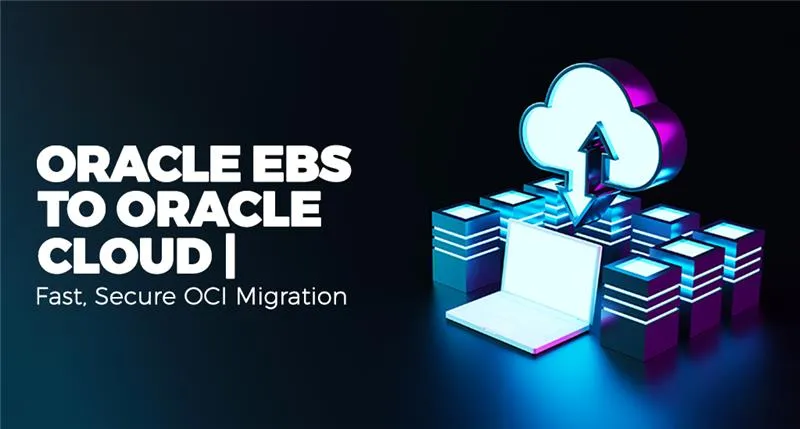In today’s rapidly evolving business environment, staying ahead of the competition requires flexibility, scalability, and the ability to leverage the latest technologies. Oracle E-Business Suite (EBS) has long been the backbone of enterprise operations for numerous organizations. However, as businesses continue to digitize, migrating Oracle EBS to Oracle Cloud Infrastructure (OCI) is becoming a key strategy for achieving long-term success.
By migrating to OCI, businesses can access enhanced performance, improved cost efficiency, and the security necessary for today’s digital landscape. But what exactly makes OCI the ideal destination for Oracle EBS migration, and how can it unlock new opportunities for your business?
Why Migrate Oracle EBS to OCI?
Oracle Cloud Infrastructure (OCI) provides a robust and secure cloud environment optimized for Oracle applications. It delivers high performance, strong security protocols, and seamless integration with Oracle’s suite of enterprise applications. Let’s dive into the key reasons why migrating Oracle EBS to OCI can benefit your organization:
- Optimal Performance and Reliability Oracle Cloud Infrastructure is designed to deliver superior performance for critical applications. For businesses running Oracle EBS, OCI provides a highly reliable and fast platform for both database and application workloads. The performance improvements that OCI offers, including dedicated compute resources and low-latency networks, ensure that EBS operations run efficiently, even during peak demand.
- Cost Efficiency with Pay-as-You-Go Flexibility One of the most significant advantages of migrating to OCI is its flexible pricing model. Instead of maintaining expensive on-premises hardware, OCI allows businesses to shift to a consumption-based model where you only pay for what you use. This approach significantly reduces the total cost of ownership (TCO) by eliminating capital expenditures and optimizing operational costs.
- Simplified Management and Automation OCI offers robust automation tools that reduce the complexity of managing Oracle EBS. Features such as automated backups, patching, and scaling ensure that IT teams can focus on more strategic tasks rather than manual system management. Additionally, OCI’s self-service provisioning allows for faster deployment and configuration of Oracle EBS environments, accelerating your time to value.
- Enhanced Security and Compliance Security is a top priority for businesses handling sensitive information, such as financial data or human resources records. OCI offers enterprise-grade security features, including strong encryption, identity management, and advanced threat protection. With Oracle’s extensive experience in regulatory compliance, OCI meets various global standards, making it an ideal platform for organizations in regulated industries such as healthcare, finance, and government.
- Seamless Integration with Oracle Applications OCI is purpose-built for Oracle applications. Whether you’re running Oracle EBS, Oracle Fusion, or other Oracle enterprise solutions, OCI provides native integrations that enhance interoperability. This tight integration streamlines workflows, enhances data accuracy, and improves overall system performance.
The Oracle EBS Migration to OCI Journey: A Step-by-Step Process
Migrating Oracle EBS to Oracle Cloud Infrastructure is a comprehensive process that requires careful planning and execution. Here’s an overview of the typical steps involved:
- Initial Assessment and Planning The first step is assessing your existing Oracle EBS environment to understand dependencies, customizations, and integrations. This phase involves identifying any challenges and designing a migration plan that minimizes disruptions to business operations. A well-defined migration strategy should include timelines, resource allocation, and risk mitigation measures.
- Data Migration and Environment Setup Migrating data from your on-premises Oracle EBS to OCI requires careful data mapping and validation. This step ensures that all critical data—such as financial records, HR information, and inventory—is securely transferred and remains intact. Concurrently, the OCI environment must be provisioned, ensuring that compute, storage, and network resources are appropriately configured for Oracle EBS.
- Testing and Optimization Before the migration is fully completed, it’s crucial to test the Oracle EBS system in the OCI environment. Testing will include validating system performance, ensuring the integrity of migrated data, and conducting user acceptance testing (UAT). During this stage, optimizations are made to enhance performance, scalability, and security in the new environment.
- Go-Live and Post-Migration Support Once testing is complete and everything is functioning as expected, the Oracle EBS system goes live on OCI. Post-migration support is essential to address any emerging issues and fine-tune the environment. OCI’s automated monitoring tools help track system health and performance, allowing for proactive management and optimization.
- Continuous Monitoring and Improvement After migration, ongoing monitoring is critical to ensure that Oracle EBS continues to perform optimally in the cloud. OCI’s real-time monitoring tools provide insights into application performance, resource utilization, and security metrics. These insights enable businesses to continuously improve the system, ensuring it evolves alongside business needs.
The Business Impact of Migrating to OCI
Migrating Oracle EBS to Oracle Cloud Infrastructure offers more than just technical benefits. The transition can have a profound impact on business operations:
- Agility and Innovation:By running Oracle EBS on OCI, businesses gain the flexibility to quickly scale up or down as needed, enabling them to adapt to changing market conditions and customer demands. OCI’s support for emerging technologies, such as AI and machine learning, also opens new avenues for innovation.
- Improved User Experience:With faster, more reliable application performance, employees will experience fewer disruptions, leading to enhanced productivity and a better user experience.
- Strategic Insights:By leveraging OCI’s cloud-based analytics and reporting capabilities, businesses can gain deeper insights into their operations, enabling data-driven decision-making and better strategic planning.
Is OCI the Right Choice for Your Oracle EBS Migration?
Oracle Cloud Infrastructure is the ideal platform for migrating Oracle EBS, offering unmatched performance, security, and scalability. For organizations already invested in Oracle technologies, OCI provides a seamless, integrated environment that enhances the performance of Oracle EBS applications while reducing operational costs.
If you’re considering moving Oracle EBS to OCI, it’s essential to partner with experienced professionals who understand both Oracle EBS and OCI. With the right expertise, the migration process can be smooth and efficient, setting your business up for long-term success.
Start Your Oracle EBS Migration to OCI Today
Ready to take your Oracle EBS to the cloud? Contact us today to learn how we can help you navigate the Oracle EBS migration to Oracle Cloud Infrastructure and unlock new levels of efficiency, security, and performance for your business.



